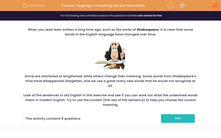When you read texts written a long time ago, such as the works of Shakespeare, it is clear that some words in the English language have changed over time.

Some are shortened or lengthened, while others change their meaning. Some words from Shakespeare's time have disappeared altogether, and we use a great many new words that he would not recognise at all.
Look at the sentences in old English in this exercise and see if you can work out what the underlined words mean in modern English. Try to use the context (the rest of the sentence) to help you choose the correct meaning.
Are you ready to get started?








